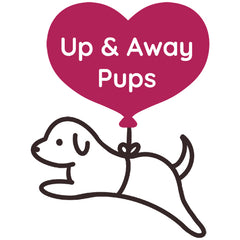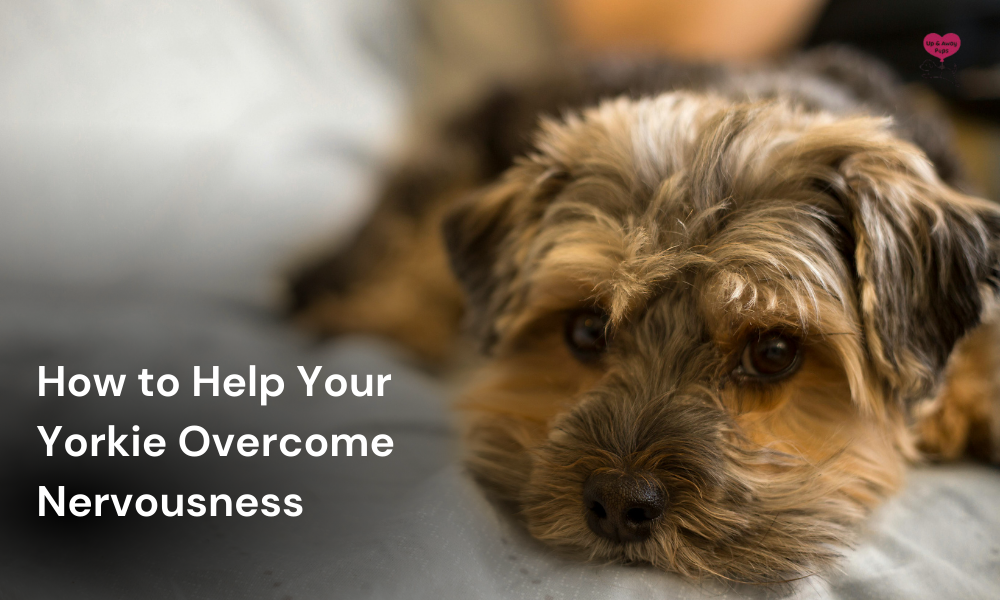How to Help Your Yorkie Overcome Nervousness
Yorkshire Terriers have attained a lot of hype recently due to their compact size and high-spirited nature. However, in the same way, regardless of anyone's daring spirit, many a Yorkie is fraught with anxiety and nervousness. Similar to other small dog breeds like Shih Tzus, Chihuahuas, and Pomeranians, Yorkies have become stressed out by different stimuli in their spaces. It is important to treat this type of nervousness for their overall well-being and to ensure that they are leading confident as well as happier lives. In our post today, we are going to check out the varied sort of strategies to aid you in managing Yorkies and help them overcome their nervousness, which is similar to the behavioral challenges often faced by small dog breeds.
Understanding Nervousness in Yorkies
Yorkies, sharing similarities to Miniature Dachshunds and Maltese, are often prone to anxiety due to their alert and sensitive nature. Nervousness in such dogs is often triggered by numerous factors that include new environments, loud noises, interactions with strangers or animals, as well as separation from the owners. For small dog breeds like Yorkies, these are the stressors that cause anxiety to manifest through excessive barking, shaking, or destructive behaviors.
Small dogs often experience nervousness that results from an elevated form of awareness. These breeds are often bred for distinctive tasks such as companionship or hunting, making them attuned to changes in their surroundings. Identifying and knowing about the specific triggers in Yorkies are the initial steps to aid them in feeling more at ease.
Signs Your Yorkie Is Nervous
Yorkies are often identical to the French Bulldogs and reveal their signs of nervousness in different ways. Addressing such behavior is essential to identify the root cause behind their anxiety. The following are the common signs included here:
Also Read : Tailoring Your French Bulldog’s Diet for Optimal Health
Excessive barking: When a Yorkie is nervous, a Pomeranian or Chihuahua might often bark at anything that moves a bit, even at the slightest sound.
Trembling or shaking: It is a common trait in small dog breeds such as Shih Tzu, where nervousness causes visible trembling.
Hiding or withdrawing: Yorkies often avoid interaction by hiding out in the corners or right under the furniture, a behavior common in Miniature Dachshunds or Maltese.
Destructive behavior: Like the Boston Terriers, the Yorkies face nervousness and start chewing on furniture, scratching, or even digging when anxious.
Restlessness: Another sign of anxiety is pacing or difficulty settling down, which is also noted in other small dog breeds, like Cavalier King Charles Spaniels.
Compulsive grooming: Nervousness often causes Yorkies, like Bichon Frises, to lick themselves excessively, leading to possible skin-related issues. Identifying these early signs enables you to intervene and help calm down your Yorkie during challenging situations.
Socialization: Exposing Your Yorkie to Different Environments
Socialization remains important to address the nervousness in Yorkies. Similar to other small dog breeds, Shih Tzus can help the Yorkies get exposed to different environments and varied sorts of experiences at a young age. The exposure aids them in establishing their confidence and reducing the signs of anxiety across new or unfamiliar settings.

You can initiate by bringing your Yorkie to a new environment controlled way. For instance, you can take your Yorkies in the quiet parts the way you would do with your Chihuahua, which helps in building their confidence outdoors. Eventually, increasing the amount of exposure can introduce them to busy spaces like bustling streets or cafes. Ensure to reward your Yorkie for their calmness with praises and treats reinforcing their positive experiences.
Ensure that their interactions are positive and slow whenever they encounter new people and other dogs, mainly breeds like Boston Terriers or Pugs. Over time, your Yorkies will become comfortable around strangers, which will reduce their anxieties in social settings.
Establishing a Routine for Your Yorkie
Like the other small dog breeds like Teacup Havapoo or Cavalier King Charles Spaniels, even Yorkies thrive on proper routine. It is important to create consistent feeding schedules, walks, playtime, and sleep since it offers better comfort and stability. Whenever the dogs know things to expect, they become less anxious.
Following a routine removes any uncertainty, which is a huge trigger towards nervousness in small dog breeds like Bichon Frise or Havanese. A routine is required to meet the sudden changes. So, introduce them to the new routine and give them time to adjust. For instance, you may require a change in their feeding times or relocating their bed. Ensure to do so in order to prevent stressing them. A predictable routine helps in calming the nervous dogs to ensure they feel more secure.
Desensitization and Counterconditioning Techniques
Counterconditioning and desensitization are two prominent ways to minimize nervousness in Yorkies and other small dog breeds. These tactics help your dog become less sensitive to triggering anxieties through eventual exposure and positive reinforcement techniques.
Desensitization consists of exposing Yorkie to the thing that turns them nervous; however, ensure of following it with less intensity. For instance, if your Yorkie gets scared of thunderstorms, stay by recording a rumble of thunder and playing it at a lower volume. With time, eventually increase its volume till they get accustomed to this sound.
Counterconditioning operates by triggering anxieties by association with a positive experience. For example, when your Yorkie becomes nervous meeting the new dogs, offer them treats whenever they face other dogs. Eventually, your Yorkie starts to associate such experiences with anything positive to aid them in overcoming fear.
Both of the methods are mainly applied to small dog breeds, including the Shih Tzus and the Maltese, who are often prone to anxiety. Your Yorkie can start learning to stay calm in situations that often cause them distress with a lot of consistency and patience.
Providing a Safe Space
It is important to create a safer space for your Yorkies while helping them deal with and overcome their nervousness. There are various small dog breeds like French Bulldogs and Chihuahuas to feel highly secure whenever they have a dedicated space to help your pup retreat in stressful situations.
Try arranging a quiet space in your home with your Yorkie's blankets, bed, and the best toys. Keep the space free from loud noises and any disruptions, offering them a calm space to relax. Offer your Yorkies a safer space the way you would do for your Pomeranian or Boston Terrier, which aids them in reducing their anxiety and offering a better sense of security whenever they get stressed out. In times of greater levels of stress, such as thunderstorms or fireworks, creating this kind of space can notably reduce the nervousness of Yorkies.
Exercise and Mental Stimulation
Regular mental and physical exercises play a notable part in minimizing anxiety in small dog breeds like Cavalier King Charles Spaniels and Pugs. Often, a tired dog is less likely to showcase nervous behaviors like excessive pacing or barking.
Regular walks often give your Yorkie important physical exercise while exposing it to new sounds and sights that boost its confidence. Using interactive toys like treat-dispensing toys and puzzle feeders can help your Yorkie stay mentally engaged, preventing any signs of anxiety or boredom.
For small dog breeds, introducing them to activities like obedience exercises or agility training offers both mental and physical challenges that help them release their nervous energy.
Calming Aids and Supplements
Yorkies require the use of calming tools or drugs to deal with, for instance, anxiety, as other tiny dog breeds. Pheromone diffusers, calming collars, and sprays copy nature's reassuring signals and should help minimize any apprehension in your canine. They also include natural remedies that include chamomile or valerian root that are most likely to calm your Yorkie to the greatest extent. It is always advised that before you initiate any calming products or supplements, you have to consult your veterinarian.

These aids are most useful when your little Yorkie is stressed, for instance, during traveling, a visit to the vet, a loud noise, or a new environment.
Seeking Professional Help
There are cases where anxiety can reach significantly hard levels, and you could be in need of professional intervention for your Yorkie. Professional dog trainers, especially those dealing with toy breeds like Yorkie and Shih Tzu, will be in a good position to advise you on the issue.
In the most serious illness, it may be necessary to adjust the dosage to the prescribed drug by a veterinarian in order to minimize anxiety. They can be useful to decrease nervousness in the short term while the other long-term behavior modification plans are being implemented.
Conclusion
If you can plan to help your Yorkie overcome their nervousness, then you need to dedicate some time, stay dedicated, and be patient. Like the other small dog breeds, Yorkies are prone to anxiety and, therefore, should be calmed gently. Through socialization, structure, acclimatization, and stimulation, you can do something to help your Yorkie become less nervous and gain more confidence.
Understanding them is knowing when they are stressed, and it's important to make sure that your Yorkie is not stressed or at least providing something that will ideally help them relax. As time passes, the family companionship dog that is the Yorkie will gradually be able to lead a fearless existence just like other small breeds of dogs.


